Theme: The Resilience and Contributions of Older Women
Each year, we commemorate “International Day of Older Persons” on 1 October to raise public awareness about the opportunities and challenges presented to the ageing populations and to mobilize the families, community groups and stakeholders to address the difficulties faced by older people. The United Nations General Assembly designated October 1 as the International Day of Older People on 14 December 1990. Since then, the day has been celebrated spanning over several thematic areas. The 2022 theme of International Day of Older Persons, serves as a hallmark and reminder of the significant role older women play in traversing global challenges and contributing to their solutions with resilience and fortitude.
The population worldwide is ageing rapidly. In 2019, the number of people aged 60 years and older was 1 billion. This number will increase to 1.4 billion by 2030 and 2.1 billion by 2050. This demographic transition has resulted in a rapid ageing in population at an unprecedented pace. By 2030, 1 in 6 people in the world will be aged 60 years or over. This will accelerate in coming decades, particularly in developing countries and will have an impact on almost all aspects of society.
According to the 2012 National census, 12.4% of the Sri Lankan population is over 60 years of age. The proportion of population aged 60 years and above, has increased from 6.6 % to 12.4% from 1981 to 2012. It is estimated that this proportion will be 25% by 2030. Feminization of elderly population due to high life expectancy of females has been observed in Sri Lanka with 44% of elderly population being males and 56% being females in 2012. Sixty one percent of the people who are over 80 years in Sri Lanka were females in 2012.
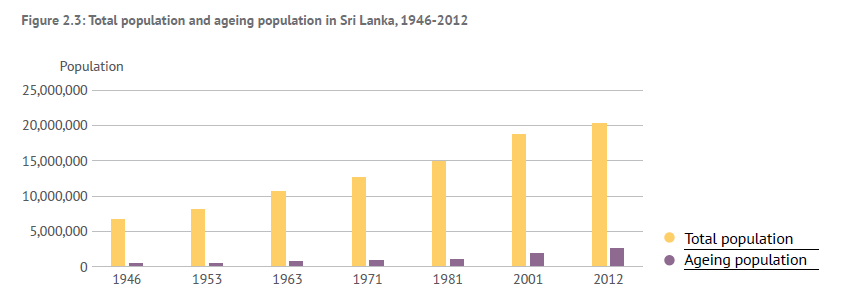
Source: Department of Census and Statistics 2015 – Sri Lanka
WHO works with Member States, UN agencies and diverse stakeholders from various sectors to foster healthy ageing in every country. The United Nations General Assembly declared 2021–2030 the Decade of Healthy Ageing and asked WHO to lead the implementation. The Decade of Healthy Ageing is a global collaboration bringing together governments, civil society, international agencies, professionals, academia, the media and the private sector for 10 years of concerted, catalytic and collaborative action to foster longer and healthier lives. The Decade builds on the WHO Global Strategy and Action Plan and the United Nations Madrid International Plan of Action on Ageing and it focuses on provision of age-friendly environment, long-term care, and integrate care and combatting of ageism.
Population ageing will have an impact on achieving Universal Health Coverage (UHC) and Sustainable Development Goal (SDG) 3. Service delivery at present is not optimized for older persons. Therefore, transforming health and social systems to provide integrated and person- centred care which could have greatest impact on functional ability in older age is an essential requirement. Adopting affordable, integrated and person-centred service delivery models and comprehensive systems of long-term care, based in the communities provide an opportunity to overcome most of these challenges.
World Health Organization published guidelines on Integrated care for older people (ICOPE) in October 2017. This guideline consists of 13 evidence-based recommendations to be implemented as person-centred integrated care for older people at the primary health care and community levels. The need of ICOPE is highlighted due to many reasons. Health care delivery given for older persons has been fragmented and challenged due to lack of coordination across service providers and settings. The objective of ICOPE is to provide all necessary services at one point of contact with the older persons.
Recognizing the importance of integrating service delivery for older people, Directorate of Youth, Elderly and Disabled (YED) of the Ministry of Health, has adopted the ICOPE package for Sri Lanka with technical and financial support of WHO Country Office. A reference book for the trainees and a training manual for the trainers have been developed and 30 primary care physicians in Colombo district have been trained as master trainers. Trained physicians will conduct training programmes at the respective primary care institutions and mobilize the PHC staff to integrate ICOPE at PHC level.
A separate manual on ICOPE was developed for the nursing officers and 25 nursing officers were trained as master trainers with the support of WHO. Trained 25 nursing officers have been resource persons to train other staff at the primary care institutions.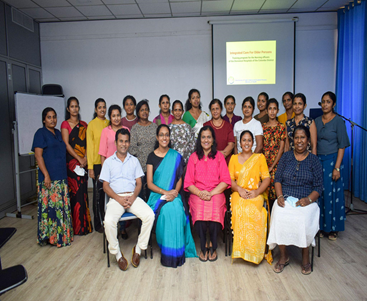
Photo credit: Directorate of Youth, Elderly and Disabled, Ministry of Health
Further to this a “situational analysis of Elderly Health Programme” was commissioned by WHO and findings were presented at a workshop to stakeholders. This report provided recommendations to identify strategies need to be adopted to strengthen the service delivery for older people in the country.
It is reported that dependency is high among elderly specially among very old group of elders. Many elderly people require some form of long-term care such as assisted living, home nursing, community care, residential care, and long stays in hospitals. With this prevailing situation trained informal caregivers to look after elderly is a vital need. WHO supported YED unit to develop a trilingual care giver guide in view of improving the care given for elderly by informal care givers.
There are many Long-Term Care Facilities (LTCF) for older people in Sri Lanka managed by both government and private sectors. LTCFs have different level of resources and some institutions may lack proper nutrition support for residents which could result in high rates of malnutrition among long-term care residents. Nutrition division, Ministry of Health, with the support of WHO, has developed guidelines on nutritional quality standards and implementation of nutritional quality standards for residential care of older people and Guide on Nutrition for Community Dwelling Older Person and Care Givers.
Further, WHO supported to conduct a national survey on “Availability of Nutrition Care Services (NNQS) in LTCFs for older people”. An advocacy and training programmes for officers representing Ministry of Health, Elderly Health Secretariat, Elderly Right Promotion Officers and managers of LTCFs and CSOs were conducted by the Nutrition division to motivate stakeholders to implement the guidelines on nutritional quality standards.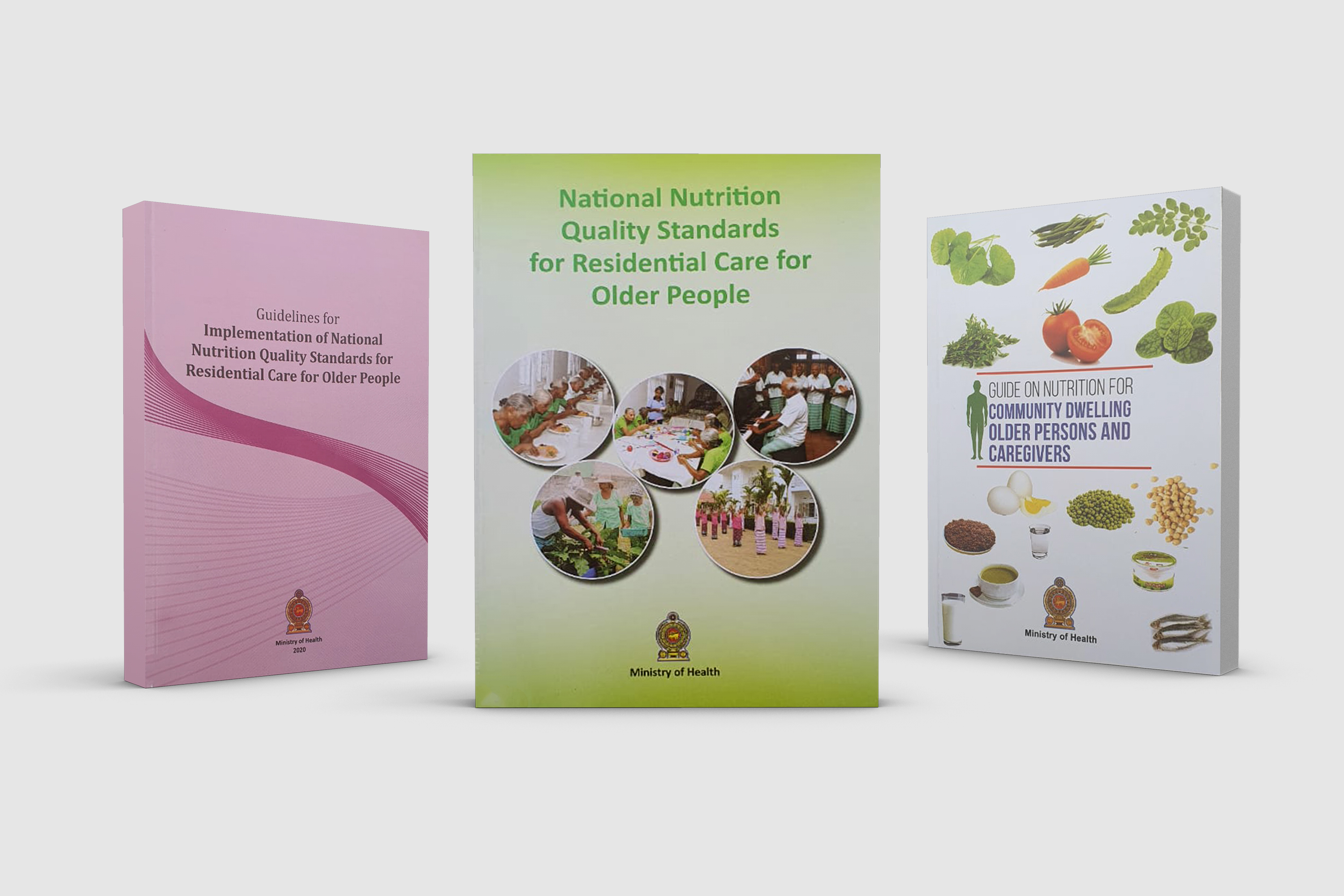
In order to build intergenerational solidarity, Directorate of Youth, Elderly and Disabled, MoH has developed “Youth 2 Elderly” booklet with the support of WHO which reflects the bond between youth and elderly. In addition, an “Elder’s diary” which reflects the snapshot of lives of elders has been developed and launched with the participation of elderly groups.

The COVID-19 pandemic has highlighted the existing gaps in policies, systems and services related to health and other related areas. COVID-19 pandemic may have affected many older people especially vulnerable elderly who are living in LTCFs. WHO country office provided disability-friendly and standard wash basins for all government-registered elderly homes and institutions with Persons with Disabilities (PWD) in order to strengthen the Infection Prevention and Control measures at those institutions.
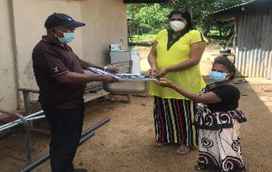
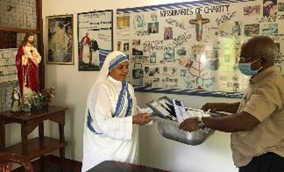
Photo credits: WHO
Furthermore, WHO stands ready to continue supporting Sri Lanka to improve the lives of older people, their families and communities they live through a multisectoral approach and deliver person-centered integrated care through primary health services.
Reference:
- Ageing Population of Sri Lanka Emerging issues, needs and policy implications Thematic Report based on Census of Population and Housing 2012: https://srilanka.unfpa.org/sites/default/files/pub-pdf/UNFPA%20Ageing%20Monograph%20Report_0.pdf
- https://www.who.int/multi-media/details/how-to-adapt-person-centered-health-services-to-ageing-populations#
- https://www.who.int/news/item/25-04-2022-integrated-care-for-older-people--who-launches-new-report-of-findings-from-the-icope-implementation-pilot-programme
- https://www.who.int/initiatives/decade-of-healthy-ageing
- https://www.who.int/news-room/fact-sheets/detail/ageing-and-health
